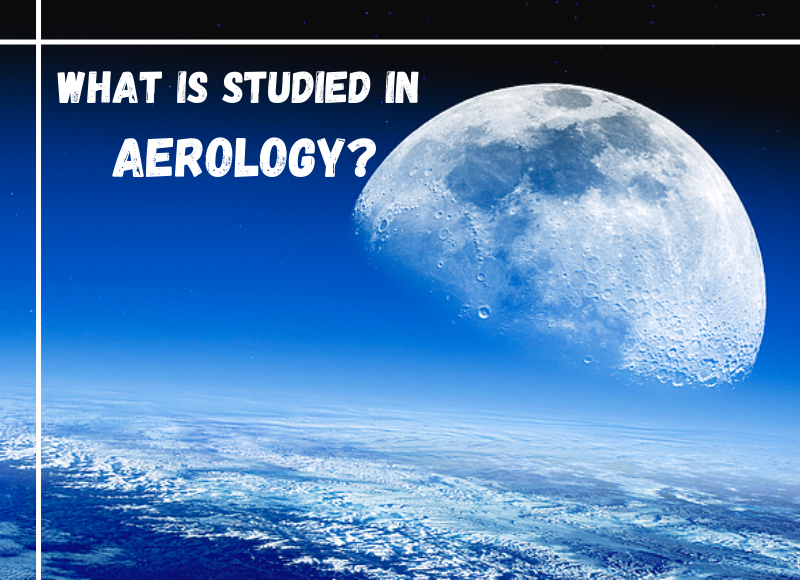We’ve all learned about the atmosphere in school; it’s a layer or layers of gases that surround a planet or other material entity and are held in place by gravity.
We all know why it’s important: it protects living things from genetic damage caused by solar UV radiation, solar wind, and cosmic rays.
Well, there are many folks who want to learn more about it; if you are one of them, then aerology is the subject for you.
So what we basically study in aerology, before we go into it, let’s first define aerology.
Table of Contents
What is Aerology?
Aerology is the branch of meteorology concerned with the observation of the atmosphere using balloons, aircraft, and other techniques.
It analyzes the entire vertical expanse of the earth’s atmosphere rather than just the atmosphere around the earth’s surface.
Air temperature, atmospheric pressure, humidity, wind speed, and ozone levels are the most widely investigated atmospheric parameters in aerology. Radioactivity, as well as other features of long-wave radiation, are studied.
Overview
The study of the earth’s atmosphere is known as aerology.
Although significant investigations into the earth’s atmosphere stretch back to the 1800s, many people date the specialized subject of aerology to 1944, when scientific equipment for atmospheric study was invented.
This area is part of the wider area of atmospheric sciences, which covers topics such as meteorology and climatology.
Meteorology
Meteorology is the study of the earth’s atmosphere and the fluctuations in moisture and temperature patterns that cause diverse weather situations.
Precipitation (rain and snow), tornadoes, thunderstorms, cyclones, and hurricanes are all prominent objects of research.
Climatology
The study of climate and how it changes through time is known as climatology.
This research enables individuals to have a better understanding of the atmospheric variables that influence weather patterns and temperature fluctuations through time.
A variety of equipment is used in aerology to measure the earth’s atmosphere. One of the most frequent is a radiosonde, which is a device that can collect periodic measurements when it moves vertically, providing a cross-section of readings that may range from relatively high in the atmosphere to ground level.
Aerologists also employ weather balloons and airplanes to collect data that might help them in their research.
Aerologists are interested in the effects like wind direction and speed, temperature, air pressure, and humidity level, including variations in these measures when sensors climb or drop.
Aerology is also concerned with ozone measurement, including usage of historical data to monitor changes in the atmosphere that may be harmful to human or animal health, and radiation monitoring.
Radiation levels in the atmosphere can fluctuate at any moment, and many countries conduct routine radiation monitoring.
What do we study in aerology?
Aerology is a discipline of atmospheric physics that investigates physical phenomena and processes that occur in the free atmosphere—that is, at a distance beyond the earth’s surface when the earth’s direct impact is no longer there.
Aerology studies the structure and composition of the earth’s atmosphere up to vast altitudes, the creation of clouds and precipitation, as well as techniques for controlling their growth, radiative heat exchange in the open atmosphere, air currents at various altitudes, including turbulent (whirlwind) motions in the atmosphere, the interaction of air masses, and so on.
Aerological research has been sparked largely by the challenges of better weather forecasting systems, as well as the advancement of aviation—for example, high-altitude jet and turbojet planes.
A large amount of data has been collected on the microstructure of clouds, condensation processes, the sizes of cloud droplets and their concentration in cloud layers, the sizes and forms of ice particles in clouds with temperatures below 0°C, and so on, which, along with data on temperature and vapor-forming moisture in clouds, has brought the solution of the artificial ice problem closer.
The study of the general atmospheric circulation up to high altitudes has received special interest; so-called jet stream currents have been identified in the troposphere and lower stratosphere.
The aerological study is carried out with the use of modern electronic equipment, such as radar and radio devices, as well as different aviation, rocket, and weather satellite equipment, and by organizing aerological observations from a continually working network of aerological observatories and stations.
Aerology is also involved with the development of methods and devices for researching the free atmosphere, known as aerological instruments.
Aerology is also concerned with ozone measurement, including the use of historical data to monitor changes in the atmosphere that may be harmful to animal and human health, including radiation monitoring.
Radiation levels in the atmosphere can fluctuate at any moment, and many countries conduct routine radiation monitoring.
Understanding the earth’s atmosphere may help advance the cause of other atmospheric sciences, as well as help us comprehend the earth’s past.
The atmosphere did not always exist in its current form, and many people are curious about how it evolved, what conditions were required for the earth’s atmosphere to grow in the way that it did, and what may damage or destroy the atmosphere.
Who is Aerologist?
An aerologist is a person who studies or is trained in the field of aerology; essentially, an aerologist is a specialist in aerology.
What Does an Aerologist Do?
Aerologists are focused on issues like wind direction and speed, temperature, air pressure, and humidity level, as well as variations in these measures when sensors climb or drop.
Some aerologists are also inquisitive about the atmospheres of other planets in order to understand more about how they evolved.
Many aerologists work for government organizations, where they monitor atmospheric conditions.
Others may work for private organizations interested in atmospheric sciences, ranging from weather prediction firms to public advocacy groups concerned about the ozone layer.
Many colleges employ researchers who do study and teach students about aerology.
Other possible jobs include working for scientific instrument firms, designing new instruments for use in aerology, and improving current equipment to make them more exact or to make changes in response to feedback from field researchers.
How to become an Aerologist?
If you want to be an aerologist, one of the first things you should think about is how much schooling you’ll need.
A bachelor’s degree is held by 6.5 percent of aerologists, according to our research.
In terms of higher education, 9.7 percent of aerologists hold a master’s degree or above.
Even though some aerologists have a college degree, it is feasible to become one with only a high school diploma or GED.
When exploring how to become an aerologist, choosing the correct major is always a vital step.
The most popular majors for an aerologist are licensing degrees or associate degree degrees.
Other degrees that are common for becoming aerologists are master’s degrees and high school diplomas.
The previous work experience will assist you to become an aerologist. Indeed, many aerologist positions require prior training in a vocation such as an esthetician.
Meanwhile, many aerologists have prior work experience as a specialist or sales associate.
Aerologist Education Requirement & Degrees
To become an aerologist, you must complete several educational prerequisites.
Aerologists typically pursue careers as cosmetologists, nursing assistants, or medical technicians.
Kennesaw State University and the University of Central Florida are the most prevalent universities where students follow their dream of becoming an aerologist.
Best Colleges For Aerologist
Higher education may often result in a higher paycheck or even a better job.
Here are some of the finest aerology colleges based on admissions rate, retention rate, mean wages of working students, working vs. non-working student ratio ten years after admission, the average cost of attendance, and median debt for graduates.
- Massachusetts Institute of Technology Cambridge,
- Princeton University, New Jersey
- Cornell University, New Yor
- University of Michigan – Ann Arbor
- University of California, Berkeley
- University of California – Los Angeles
- University of Wisconsin – Madison
- Florida State University- Florida
- University of Maryland – College Park
- North Carolina State University
In Conclusion
Aerology is a discipline of meteorology that explores the entire vertical range of the Earth’s atmosphere, rather than only the atmosphere around the Earth’s surface. Air temperature, atmospheric pressure, humidity, wind speed, and ozone levels are the most widely investigated atmospheric parameters in aerology.









 How to Study in College?
How to Study in College?